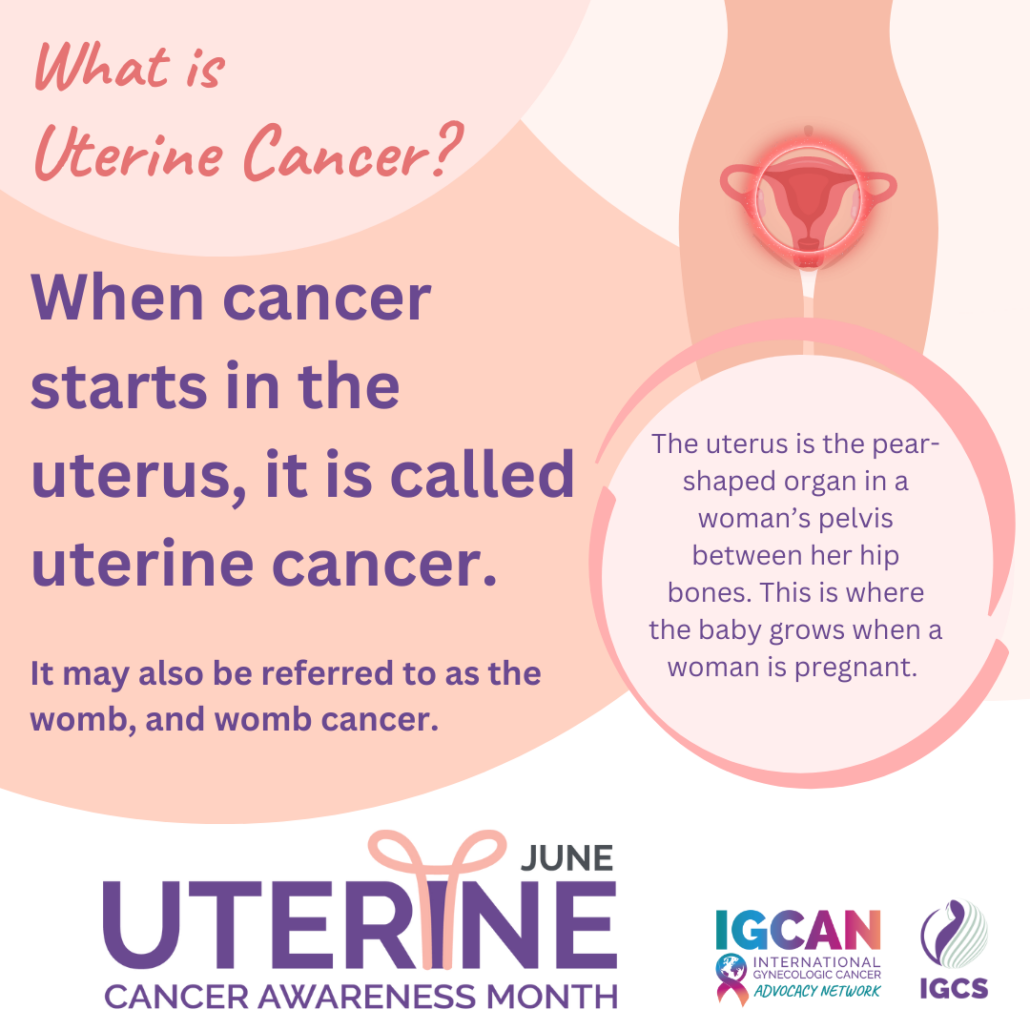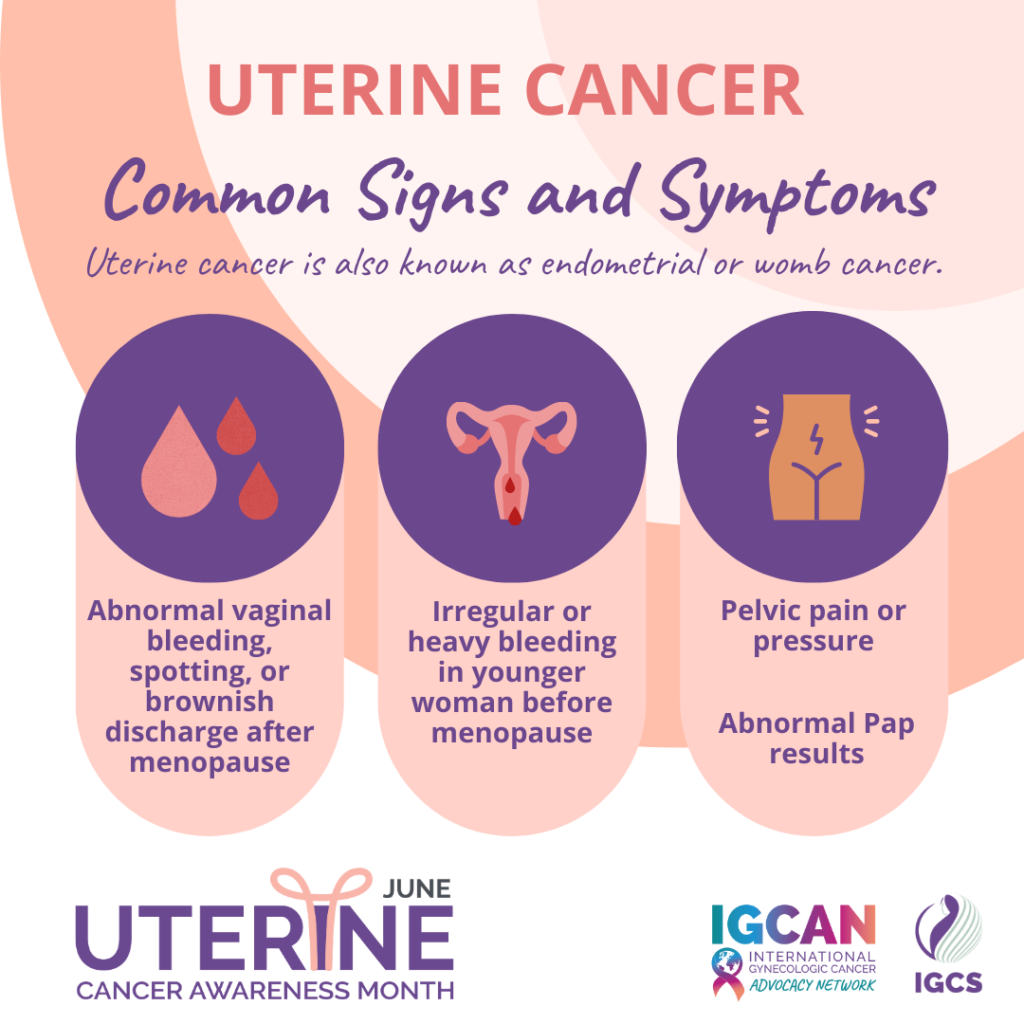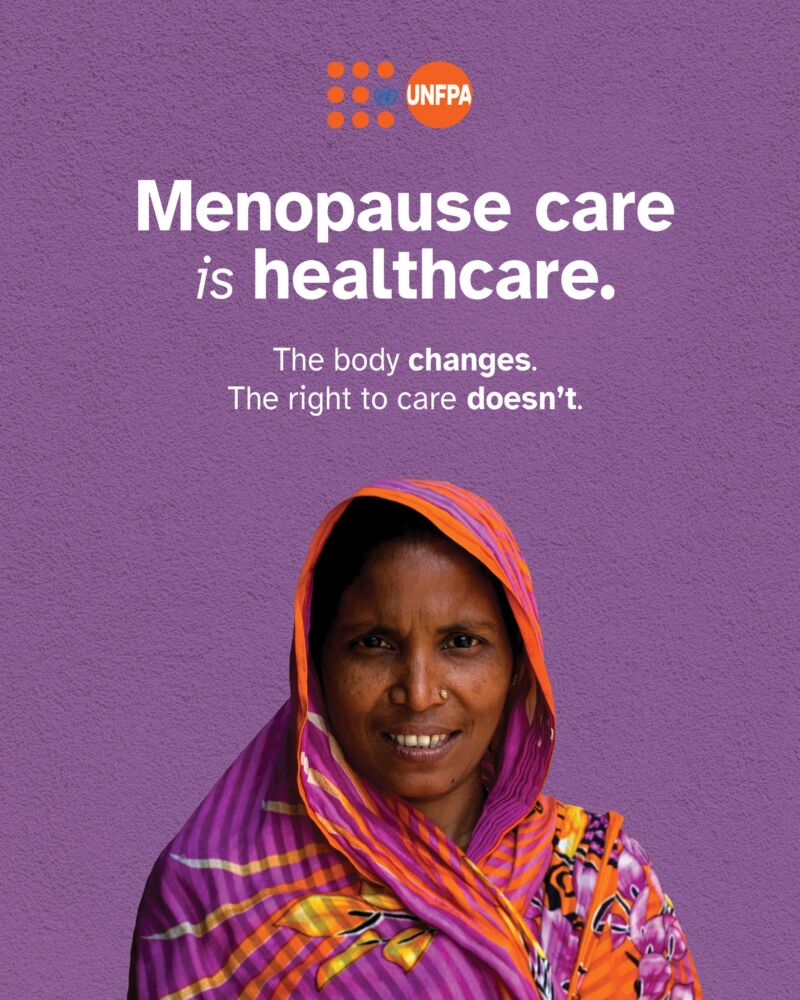“Most uterine cancers are found in women who are
going through or who have gone through menopause—
the time of life when your menstrual periods stop”.1
Umbrella
What may the Uterine Cancer Umbrella include?
Depending on the Source (DotS) this Umbrella may include:
- Cancer of the Uterus
- Endometrial Cancer
- Sarcoma of the Uterus
- Uterine Cancer
- Uterus Cancer
- Womb Cancer
Uterus
What is the uterus?
DotS the definition of uterus may vary. The (United States) Centers for Disease Control and Prevention’s (CDC) definition is:
“The uterus is the pear-shaped organ in a woman’s pelvis (between the hip bones). The uterus, also called the womb, is where the baby grows when a woman is pregnant”.2
Uterine Cancer
What is uterine cancer?
DotS the definition of uterine cancer may vary. In Uterine Cancer: Types of Uterine Cancer the International Gynecologic Cancer Society’s (IGCS) definition is:
There are two primary types of uterine cancer:
- Endometrial cancer, which is the most common form of uterine cancer. Endometrial cancer begins in the inner lining of the womb, known as the endometrium
- Uterine sarcoma forms in the muscles and supporting tissues of the uterus. It is rare in comparison to other uterine cancers”.3
Signs and Symptoms
What may be signs and symptoms of endometrial cancer?
In Uterine Cancer: Signs and Symptoms the IGCS explain:
- Vaginal bleeding after menopause
- Bleeding between periods
- An abnormal watery or blood-tinged vaginal discharge
- Pelvic pain or pressure”.4
Cause
What causes the most common type of uterine cancer, endometrial cancer?
In Womb Cancer: Risks and Cause of Womb Cancer the (United Kingdom) Cancer Research UK elaborate on:
“Being overweight or obese is one of the biggest risks of womb cancer in the UK. There are some other risk factors that can increase your risk of developing womb cancer”.5
Risk Factors
What are risk factors for uterine cancer?
In Uterine Cancer: Uterine Cancer Risk Factors – Conditions That Can Increase Risk Factors the CDC explain:
- Are older than 50
- Have obesity
- Take estrogen by itself (without progesterone) for hormone replacement during menopause
- Have had trouble getting pregnant, or have had fewer than five periods in a year before starting menopause
- Take tamoxifen, a drug used to prevent and treat certain types of breast cancer
- Have close family members who have had uterine, colon, or ovarian cancer.
If one or more of these things is true for you, it does not mean you will get uterine cancer. But you should speak with your doctor to see if he or she recommends more frequent exams”.6
Age
Is there an association between age and uterine cancer?
In Uterine Cancer: Fast Facts the IGCS note:
- “Uterine cancer most frequently occurs in women over the age of 45, though it can affect younger women”.7
Menopause
Is there an association between menopause and uterine cancer?
In Uterine Cancer: Uterine Cancer Basics – Types the CDC note:
“All women are at risk for uterine cancer as long as they have a uterus, and the risk increases with age. Most uterine cancers are found in women who are going through or who have gone through menopause—the time of life when your menstrual periods stop”.8

In Womb (Uterus) Cancer: Causes – Who Is More Likely To Get Womb Cancer the (United Kingdom) NHS elaborate on:
You cannot get womb cancer if you’ve had surgery to remove your womb (hysterectomy)”.9
In Cancer Facts for Women: Endometrial Cancer the American Cancer Society (ACS) note:
Common or Not
How common is uterine cancer?
In June Is Uterine Cancer Awareness Month: Most Common Gynecologic Cancer on the Rise the IGCS elaborate on:
Pap Test
Does the Pap test screen for uterine cancer?
No. According to the CDC:
Does the Pap test screen for endometrial cancer?
No. The ACS note:
Health Care Provider
What if I think I have uterine cancer?
If you think you have uterine cancer, it may be in your best interest to choose to talk to your health care provider about this. The (United States) Mayo Clinic explain:
“See your healthcare professional as soon as you can if you bleed from your vagina after menopause”.14
In Womb (Uterus) Cancer: Overview – Get Your Symptoms Checked the NHS note:
“It’s important to get any symptoms of womb cancer checked as soon as possible. Finding it earlier makes it easier to treat”.15
Cancer Australia explain:
“If you have been told you have ‘cancer of the uterus’, ‘cancer of the womb’ or ‘uterine cancer’, and you are not sure if it is endometrial cancer or uterine sarcoma, check with your doctor”.16
The CDC also note:
“If your doctor says that you have uterine cancer, ask to be referred to a gynecologic oncologist—a doctor who has been trained to treat gynecologic cancers, including uterine cancer. This doctor will work with you to create a treatment plan”.17
Health Topics A-Z
Where may I find Health Topics A-Z related to Uterine Cancer?
In Health Topics A-Z you may find:
Links
Where may I find Links related to Uterine Cancer?
Your country may have Links similar to:
Links
This Links List to third party websites is neither comprehensive nor exhaustive. Inclusion on this Links List does not imply endorsement or recommendation. Non-inclusion on this Links List does not imply non-endorsement or non-recommendation. Third party websites are not under the control of Meno Martha International Menopause Directory. Third party websites may contain explicit medical images and/or sexual references. Please read Meno Martha International Menopause Directory’s Links Policy before proceeding to a Link. Please contact Webmaster if you experience a problem with a Link.New or Updated
- About Uterine Cancer
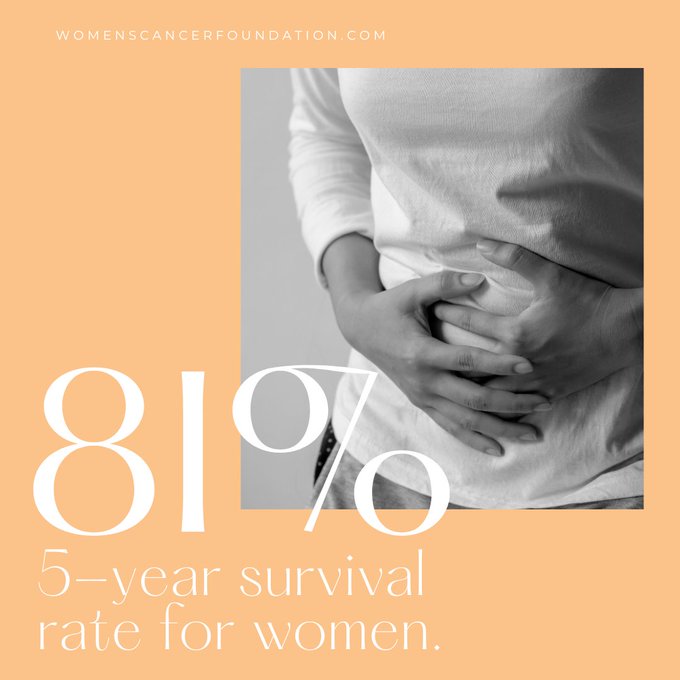
- Adenomyosis
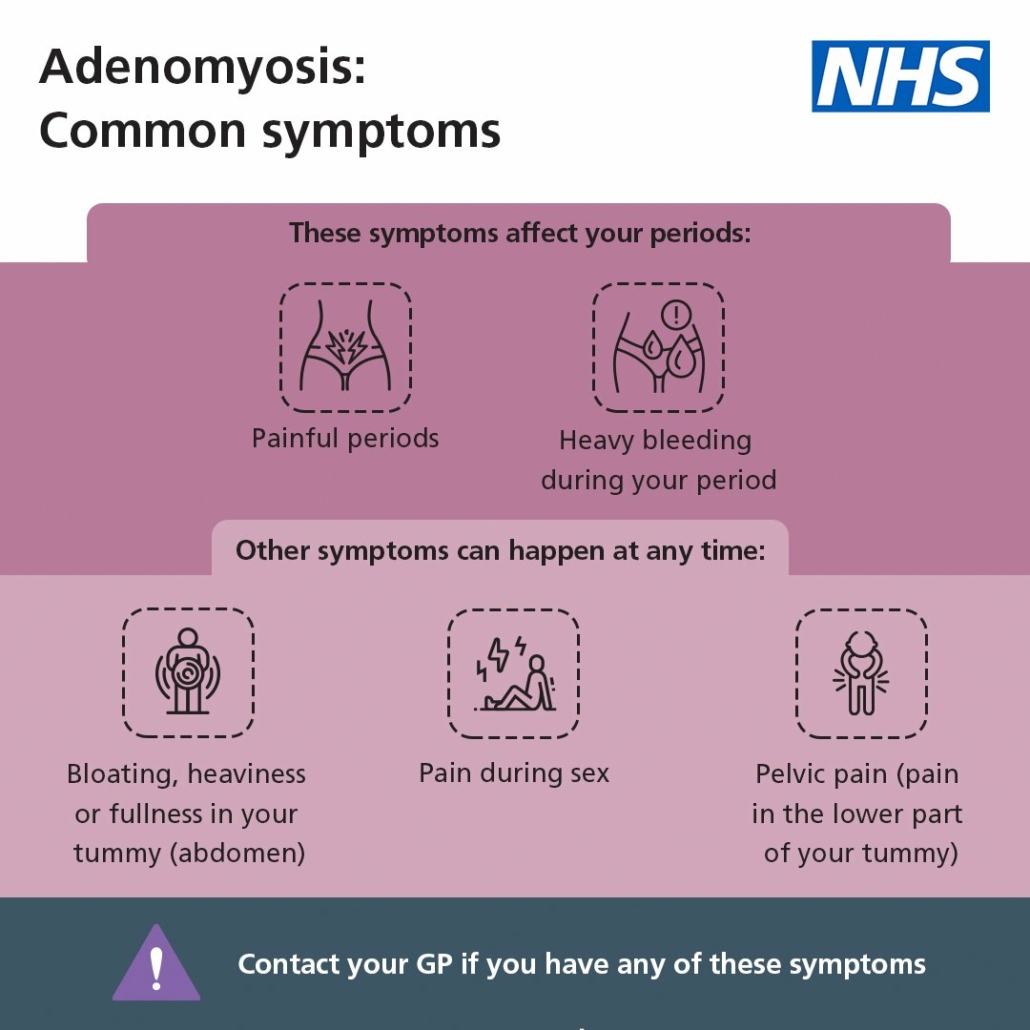
- Bleeding Between Periods? How To Tell If It’s A Problem
- British Gynaecological Cancer Society and British Menopause Society Guidelines Management of Menopausal Symptoms Following Treatment of Gynaecological Cancer
- Consumer Video and Podcast Series: 2025 Consumer Videos and Podcasts – Abnormal Uterine Bleeding—When To See A Clinician
- Don’t Ignore PCOS Is A Risk Factor for Endometrial Cancer
- Does Hormone Replacement Therapy Increase Cancer Risk? Does HRT Increase the Risk of Endometrial (Womb) Cancer?
- ECANA [Endometrial Cancer Action Network for African-Americans]
- Endometrial Cancer
- Endometrial Cancer
- Endometrial Cancer
- Endometrial Cancer
- Endometrial Cancer
- Endometrial Cancer Prevention (PDQ)–Patient Version
- Endometrial Cancer Screening (PDQ)–Patient Version
- Endometrial Cancer Treatment (PDQ)–Patient Version [+ Images]
- Endometrial Cancer: About Endometrial Cancer
- Endometrial Cancer: Early Detection, Diagnosis, and Staging – Questions To Ask What Should You Ask About Endometrial Cancer?
- Endometrial Cancer: What Are the Risk Factors for Endometrial Cancer?
- Endometrial Cancer: What Are the Symptoms of Endometrial Cancer?
- Endometriosis and Endometrial Cancer
- Foundationforwomenscancer.org [Foundation for Women’s Cancer, United States]
- Gestational Trophoblastic Disease
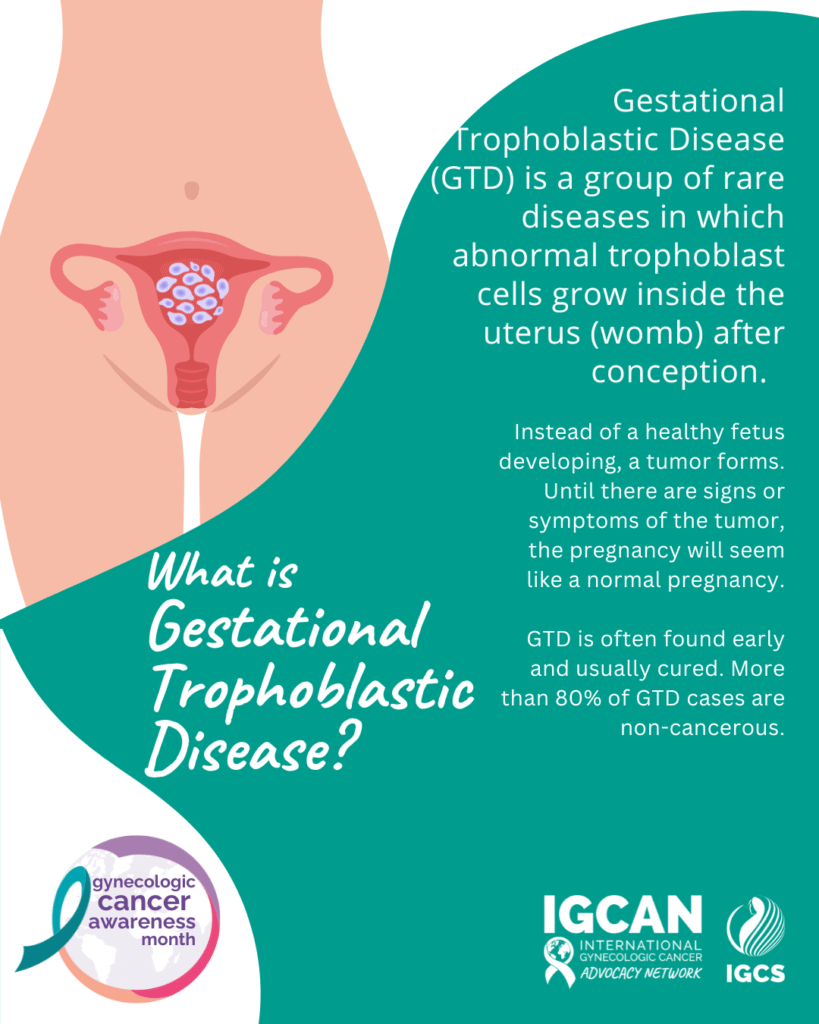
- Gynae Cancer Awareness Month [September, United Kingdom]
- Gynaecological Cancers
- Gynecologic Cancer Awareness Month [September]
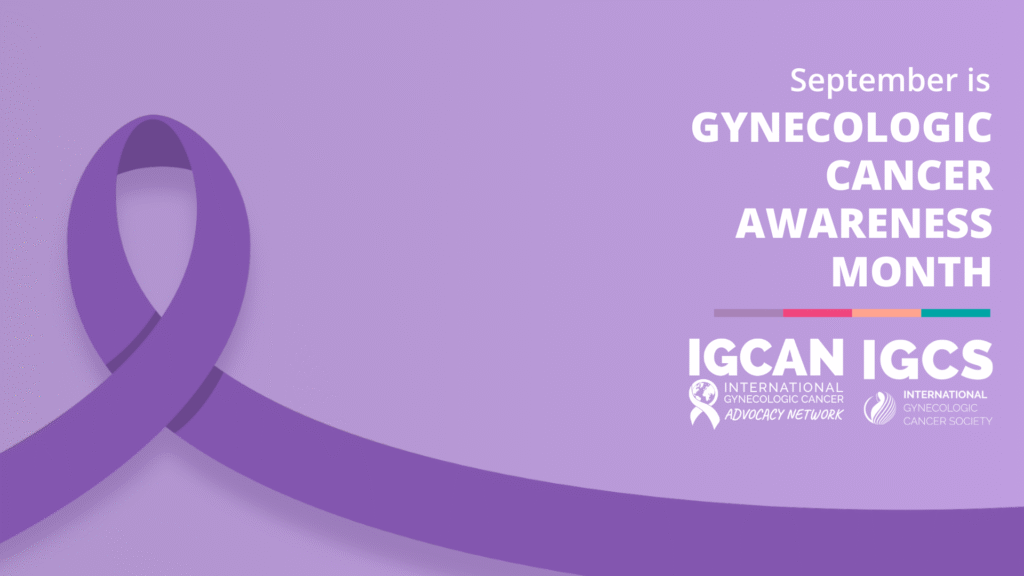
- Gynecologic Cancer Awareness Month [September, United States]
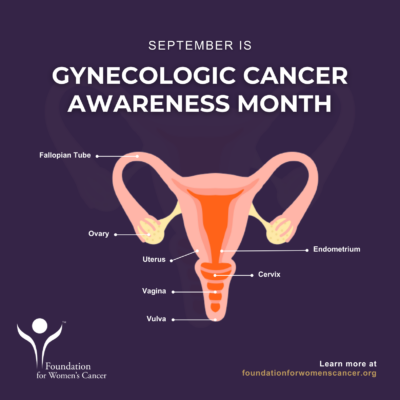
- Gynecologic Cancers
- Gynecologic Cancers
- How Cancer Can Affect Sex and Intimacy
- How Cancer Surgery Can Affect Sex for Women
- Hysterectomy
- Hysterectomy
- Hysterectomy.org

- International Gynecologic Cancer Advocacy Network (IGCAN)
- International Gynecologic Cancer Society
- Is Adnenomyosis A Progressive Condition?
- June Is Uterine Cancer Awareness Month
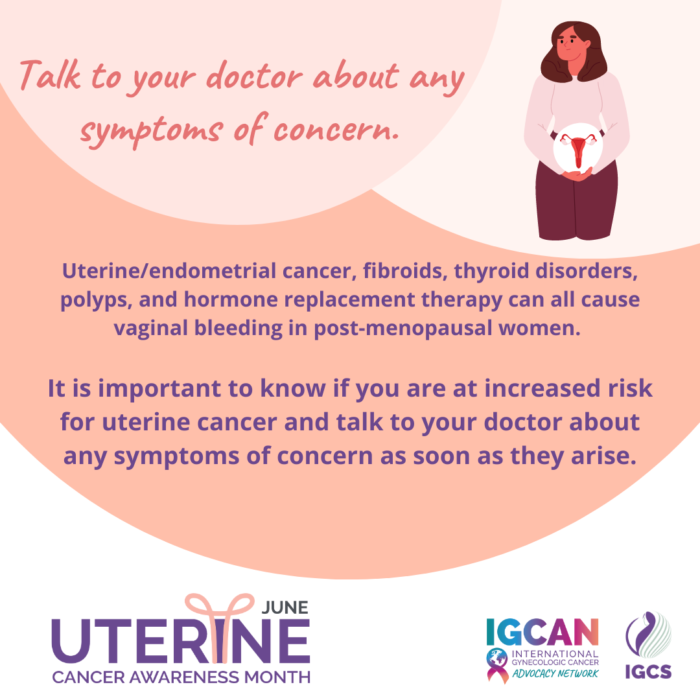
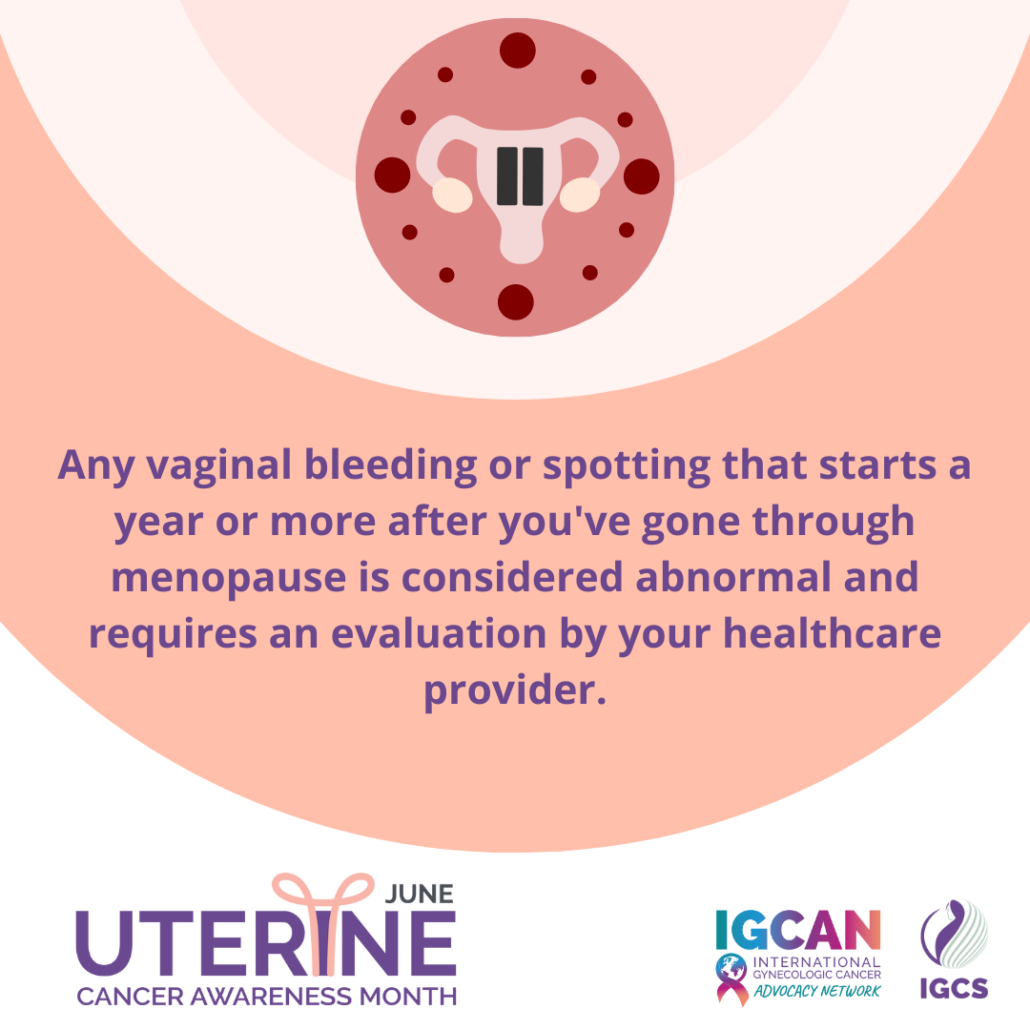
- Lynch Syndrome
- Lynch Syndrome
- Lynch Syndrome [+ Video: What Is Lynch Syndrome?]
- Management of Menopausal Symptoms Following Treatment of Gynaecological Cancer
- Mayo Clinic Minute: Endometrial Cancer Associated With Polycystic Ovary Syndrome [+ Video Courtesy: Mayo Clinic News Network]
- Mayo Clinic Minute: Tips From A Gynecological Surgeon on Recovery From Surgery [+ Video Courtesy: Mayo Clinic News Network]
- Menopause and Womb Cancer

- Menstrual Calendar
- National Center for Complementary and Integrative Health: Herbs At A Glance
- National Center for Complementary and Integrative Health: How Safe Is This Product or Practice?
- Pap Smear: Still Needed After Hysterectomy?
- Peachestrust.org [Peaches Womb Cancer Trust, United Kingdom]
- Periods Information Hub
- Polycystic Ovary Syndrome
- Polycystic Ovary Syndrome
- Postmenopausal Bleeding
- Premature and Early Menopause
- Sexual Health and Wellbeing
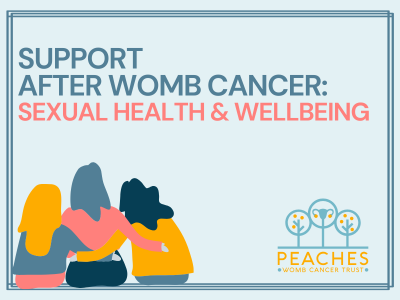
- Sharecancersupport.org [Share Cancer Support, United States]
- Sharecancersupport.org [Share Cancer Support, United States]: Videos & Past Webinars
- Support After Womb Cancer: Talking Therapy

- Support Videos: Preparing for Womb Surgery
- Support Videos: Understanding Womb Cancer
- Support Videos: Welcome To Peaches’ Womb Cancer Video Series: An Introduction By Professor Emma Crosbie
- Tips for Tracking Your Bleeding
- Understanding Gyn Cancers
- Uterine Cancer
- Uterine Cancer

- Uterine Cancer
- Uterine Cancer
- Uterine Cancer (Endometrial Cancer)
- Uterine Cancer (Endometrial Cancer)
- Uterine Cancer Rates Are Increasing: What Can You Do To Protect Yourself?
- Uterine Cancer [+ Video: 4 Risk Factors of Uterine Cancer]
- Uterine Cancer: Reducing Risk for Uterine Cancer
- Uterine Cancer: Symptoms of Uterine Cancer [+ Video: Understanding Uterine Cancer]
- Uterine Cancer: Treatment of Uterine Cancer
- Uterine Cancer: Uterine Cancer Basics
- Uterine Cancer–Patient Version
- Uterine Fibroids
- Uterine Sarcoma
- Uterine Sarcoma
- Uterine Sarcoma Treatment (PDQ)–Patient Version [+ Image]
- Uterine Sarcoma: Early Detection, Diagnosis, and Staging – What Should You Ask Your Doctor About Uterine Sarcoma?
- Uterine Sarcoma: What Is Uterine Sarcoma?
- Uterine/Endometrial Cancer/GTD
- Uterine/Endometrial Cancer/GTD: Gestational Trophoblastic Disease (GTD)
- Videos and Podcasts: Videos – How Do I Deal With the Menopause After A Diagnosis of Gynaecological Cancer
- Videos and Podcasts: Videos – Menopause and Abnormal Bleeding
- Webinars: Abnormal Uterine Bleeding In Perimenopausal and Postmenopausal Women
- Webinars: Sexual Dysfunctions, Update on Gynae Cancers and Management
- What Is A Hysterectomy?
- What Is Adenomyosis?
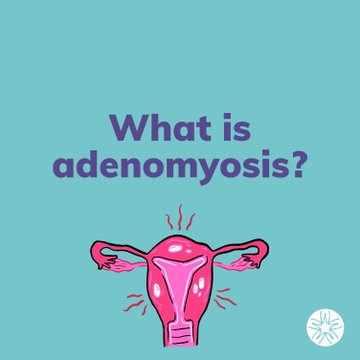
- What Is An Endometrial Biopsy?
- What Is Endometrial Cancer?
- Womb (Uterus) Cancer
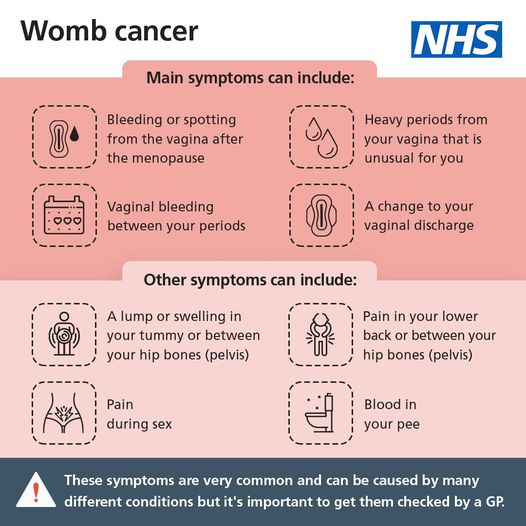
- Womb Cancer
- Womb Cancer
- Womb Cancer
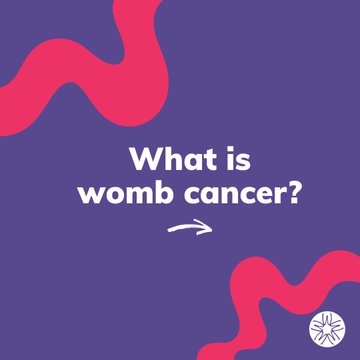
- Womb Cancer
- World GO Day [World Gynecologic Oncology Day, 20 September 2025]

Sources
Where may I find the Sources quoted?
You may find the Sources quoted at:
Sources
- Uterine Cancer: Uterine Cancer Basics – Types. 09 September 2024. Centers for Disease Control and Prevention https://www.cdc.gov/uterine-cancer/about/ Accessed: 21 January 2026
- Uterine Cancer: Uterine Cancer Basics – What It Is. 09 September 2024. Centers for Disease Control and Prevention https://www.cdc.gov/uterine-cancer/about/ Accessed: 21 January 2026
- Uterine Cancer: Types of Uterine Cancer. International Gynecologic Cancer Society https://igcs.org/uterine/#el-e695d19b Accessed: 21 January 2026
- Uterine Cancer: Signs and Symptoms. International Gynecologic Cancer Society https://igcs.org/uterine/#el-fe32cc10 Accessed: 21 January 2026
- Womb Cancer: Risks and Cause of Womb Cancer. Last Reviewed: 22 February 2024. Cancer Research UK https://about-cancer.cancerresearchuk.org/about-cancer/womb-cancer/risks-causes Accessed: 21 January 2026
- Uterine Cancer: Uterine Cancer Risk Factors – Conditions That Can Increase Risk. 09 September 2024. Centers for Disease Control and Prevention https://www.cdc.gov/uterine-cancer/risk-factors/ Accessed: 21 January 2026
- Uterine Cancer: Fast Facts. International Gynecologic Cancer Society https://igcs.org/uterine/ Accessed: 21 January 2026
- Uterine Cancer: Uterine Cancer Basics – Types. 09 September 2024. Centers for Disease Control and Prevention https://www.cdc.gov/uterine-cancer/about/ Accessed: 21 January 2026
- Womb (Uterus) Cancer: Causes – Who Is More Likely To Get Womb Cancer. Page Last Reviewed: 29 October 2024. NHS https://www.nhs.uk/conditions/womb-cancer/causes/ Accessed: 21 January 2026
- Cancer Facts for Women: Endometrial Cancer. Last Revised: 05 May 2025. American Cancer Society https://www.cancer.org/healthy/findcancerearly/womenshealth/cancer-facts-for-women Accessed: 21 January 2026
- June Is Uterine Cancer Awareness Month: Most Common Gynecologic Cancer on the Rise. International Gynecologic Cancer Society https://igcs.org/ucam/ Accessed: 21 January 2026
- Uterine Cancer: Screening for Uterine Cancer – What To Know. 09 September 2024. Centers for Disease Control and Prevention https://www.cdc.gov/uterine-cancer/screening/ Accessed: 21 January 2026
- Cancer Facts for Women: Endometrial Cancer – What You Can Do: Know Your Risk and the Signs. Last Revised: 05 May 2025. American Cancer Society https://www.cancer.org/healthy/findcancerearly/womenshealth/cancer-facts-for-women Accessed: 21 January 2026
- Menopause: Symptoms & Causes – Symptoms: When To See A Doctor. 07 August 2024. Mayo Clinic https://www.mayoclinic.org/diseases-conditions/menopause/symptoms-causes/syc-20353397 Accessed: 21 January 2026
- Womb (Uterus) Cancer: Overview – Get Your Symptoms Checked. Page Last Reviewed: 29 October 2024. NHS https://www.nhs.uk/conditions/womb-cancer/#when-to-see-a-gp Accessed: 21 January 2026
- Endometrial Cancer: What Is Endometrial Cancer? Last Updated: 14 February 2025. Cancer Australia https://canceraustralia.gov.au/affected-cancer/cancer-types/gynaecological-cancers/endometrial-cancer Accessed: 21 January 2026
- Uterine Cancer: Treatment of Uterine Cancer – How Is Uterine Cancer Treated? 09 September 2024. Centers for Disease Control and Prevention https://www.cdc.gov/uterine-cancer/treatment/ Accessed: 21 January 2026


